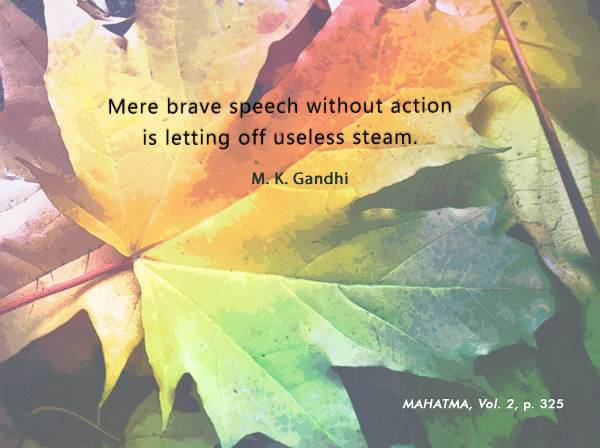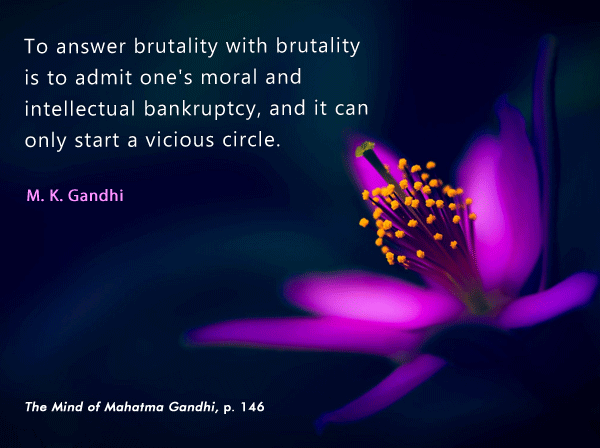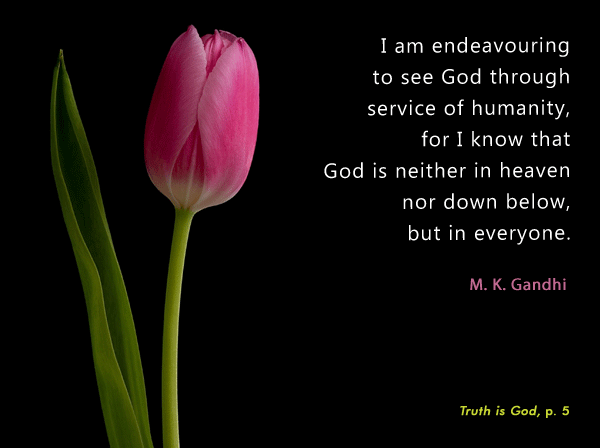Sunday, November 8, 2015
Saturday, November 7, 2015
"Nonviolence, the only short-cut"
"Nonviolence, the only short-cut"
“I do not believe in short-violent-cuts to success.”
–Gandhi (Harijan, December 11, 1924)
The Global War on Terror tries to sell us the false idea that we can effectively fight terrorism by killing “terrorists,” instead of addressing the conditions that led to terrorism in the first place. A “short-violent-cut to success,” instead of addressing economic inequality, lack of basic needs like education: that’s long-term work. More difficult, costly, the advocates of violent means proclaim. Why do some of us believe them?
Maria Montessori would suggest, have a look at the way we interact with children. What do we believe is the best way to deal with a tantrum or so-called misbehavior from a child? Perhaps, say, the child has broken a household agreement--or a household item. What do you do? Punish them? Isolate them, as we would send someone to prison? These are our version of “short-violent-cuts to success.” Maybe the tantrum stops, maybe they stay in their room for hours. What did they learn? To become a better communicator, to know how to meet their needs? Or simply that some people have more power than others and they can use that power to get their way? Where there was an opportunity for real transformation–the kind that nonviolence alone can bring about–these short-cuts some parents take daily over time lead children, future grown-ups, to accept these kinds of dynamics in their dealings with others — and go on to raise more children along the same lines. It can give us a keen insight into how we might go beyond violence in our political dealings. Violent short-cuts often lead us into quagmires.
Montessori’s and Gandhi’s ideas were more than a hunch; they were convictions based on their personal experience. But where’s the data to prove it, some might still ask. Professor of Terrorist Studies, Erica Chenoweth, conducted a now world-famous study with Prof. Maria Stephan on the success of nonviolent campaigns worldwide as compared with violent ones. What they found added quantitative support to their convictions: Nonviolent campaigns are twice as likely to succeed than violent ones, and take less time (3 years as opposed to roughly 9). The case is made: the only viable short-cut to success is nonviolence.
Experiment in Nonviolence:
How can we develop the habit of looking realistically at the long term when we’re facing a conflict or some kind of personal problem?
Courtesy: www.mettacenter.org
“I do not believe in short-violent-cuts to success.”
–Gandhi (Harijan, December 11, 1924)
The Global War on Terror tries to sell us the false idea that we can effectively fight terrorism by killing “terrorists,” instead of addressing the conditions that led to terrorism in the first place. A “short-violent-cut to success,” instead of addressing economic inequality, lack of basic needs like education: that’s long-term work. More difficult, costly, the advocates of violent means proclaim. Why do some of us believe them?
Maria Montessori would suggest, have a look at the way we interact with children. What do we believe is the best way to deal with a tantrum or so-called misbehavior from a child? Perhaps, say, the child has broken a household agreement--or a household item. What do you do? Punish them? Isolate them, as we would send someone to prison? These are our version of “short-violent-cuts to success.” Maybe the tantrum stops, maybe they stay in their room for hours. What did they learn? To become a better communicator, to know how to meet their needs? Or simply that some people have more power than others and they can use that power to get their way? Where there was an opportunity for real transformation–the kind that nonviolence alone can bring about–these short-cuts some parents take daily over time lead children, future grown-ups, to accept these kinds of dynamics in their dealings with others — and go on to raise more children along the same lines. It can give us a keen insight into how we might go beyond violence in our political dealings. Violent short-cuts often lead us into quagmires.
Montessori’s and Gandhi’s ideas were more than a hunch; they were convictions based on their personal experience. But where’s the data to prove it, some might still ask. Professor of Terrorist Studies, Erica Chenoweth, conducted a now world-famous study with Prof. Maria Stephan on the success of nonviolent campaigns worldwide as compared with violent ones. What they found added quantitative support to their convictions: Nonviolent campaigns are twice as likely to succeed than violent ones, and take less time (3 years as opposed to roughly 9). The case is made: the only viable short-cut to success is nonviolence.
Experiment in Nonviolence:
How can we develop the habit of looking realistically at the long term when we’re facing a conflict or some kind of personal problem?
Courtesy: www.mettacenter.org
Friday, November 6, 2015
Gandhi Journal Article-I : November 2015
Gandhi Journal Article-I (November 2015)
Mahatma Gandhi and Bhagat Singh : A Clash of Ideology
By Jai Narain Sharma
Great men of all generations have been anxious about improvement of the lot of human beings. But how to realize it remains a formidable task for every age. Even though the goal is similar, the means to achieve the goal can differ. And this difference in approach can generate a lot of controversy. This is precisely what happened between Mahatma Gandhi and Sardar Bhagat Singh, the two great statesmen of modern India. As a result, Bhagat Singh has been ranked as a rival of Mahatma Gandhi. It has been held in some quarters that while Gandhi was the sun of nationalism around which all the planets of the Indian National Congress revolved, Bhagat Singh was a star that pursued an orbit of its own.
READ FULL ARTICLE
The opposite of love
The opposite of love
“I am trying every moment of my life to be guided by ahimsa, by love.”
–Gandhi (Harijan, January 12, 1934)
Hafiz asked Rabia, "O Daughter of God, is hate the opposite of love?" She replied, “No. Love has no opposite.”
Rabi’a, the 7th Century mystic from Basra (not yet Iraq) and founder of the Sufi movement, was voicing the very vision that would be foundational for Gandhi: that the world is based on sat ‘Truth, reality, the good’ so that in the long run nonviolence has got to prevail, and any victory of violence, which denies love, which is the expression of asat or unreality “is out of the question.”
Nonviolence, which in the fullest sense is ultimately rooted in this vision, invites us to take our destinies into our own hands and actively embrace our highest values.
Love, Gandhi found, is a guide. Every moment.
Another Sufi mystic, Ansari of Herat, still centuries before the Mahatma, warned, Watch vigilantly the state of thine own mind, love of God begins in harmlessness. Ahimsa.
This is an extremely high calling; an ideal. But we can work at it daily, moment by moment, trying to be vigilant not toward others, but toward oneself, our own motivations, words and even smallest actions. And when we do, love-energy, nonviolence, can move through us freely. Nothing can stop it. What it can lead to in the end has been described, I think without exaggeration, as becoming love itself, union with what is Real, being completely natural, fully human.
Experiment in Nonviolence:
Without letting yourself get too self-conscious, set aside some time to ‘watch vigilantly:’ what were your motivations today?
Courtesy: www.mettacenter.org
“I am trying every moment of my life to be guided by ahimsa, by love.”
–Gandhi (Harijan, January 12, 1934)
Hafiz asked Rabia, "O Daughter of God, is hate the opposite of love?" She replied, “No. Love has no opposite.”
Rabi’a, the 7th Century mystic from Basra (not yet Iraq) and founder of the Sufi movement, was voicing the very vision that would be foundational for Gandhi: that the world is based on sat ‘Truth, reality, the good’ so that in the long run nonviolence has got to prevail, and any victory of violence, which denies love, which is the expression of asat or unreality “is out of the question.”
Nonviolence, which in the fullest sense is ultimately rooted in this vision, invites us to take our destinies into our own hands and actively embrace our highest values.
Love, Gandhi found, is a guide. Every moment.
Another Sufi mystic, Ansari of Herat, still centuries before the Mahatma, warned, Watch vigilantly the state of thine own mind, love of God begins in harmlessness. Ahimsa.
This is an extremely high calling; an ideal. But we can work at it daily, moment by moment, trying to be vigilant not toward others, but toward oneself, our own motivations, words and even smallest actions. And when we do, love-energy, nonviolence, can move through us freely. Nothing can stop it. What it can lead to in the end has been described, I think without exaggeration, as becoming love itself, union with what is Real, being completely natural, fully human.
Experiment in Nonviolence:
Without letting yourself get too self-conscious, set aside some time to ‘watch vigilantly:’ what were your motivations today?
Courtesy: www.mettacenter.org
Subscribe to:
Comments (Atom)


